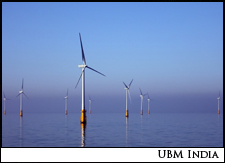
Group Director
UBM India
Rajneesh Khattar, Group Director, UBM India, expects wind and solar energy to get a big push from the Narendra Modi government. Khattar, who leads Renewable Energy India, one of Asia’s largest and most influential platforms for addressing the challenges in renewable energy, is also hopeful that the development of offshore wind energy will get a fillip in the coming years.
The Government of India has set ambitious goals to increase the share of renewable energies in the electricity mix of the country aiming to enhance the energy supply in an eco-friendly manner and to lessen the dependency on fossil fuel imports, causing a big hit to the national exchequer. Within the last decade, the share of RE of grid connected installed capacity has increased from merely 2 per cent to 12.5 per cent, and is predicted to go to more than 15 per cent by 2020.
The Jawaharlal Nehru National Solar Mission was launched during the UPA regime on January 11, 2010, by the then Prime Minister. The Mission has set the ambitious target of deploying 20,000 MW of grid connected solar power by 2022 and is aimed at reducing the cost of solar power generation in the country through (i) long-term policy; (ii) large-scale deployment goals; (iii) aggressive R&D; and (iv) domestic production of critical raw materials, components and products, as a result to achieve grid tariff parity by 2022. The Mission is expected to create an enabling policy framework to achieve this objective and make India a global leader in solar energy.
It is expected that wind and solar energy will get a big push under the Narendra Modi-led NDA government with clear signals to revolutionise the Indian solar sector. The government is likely to harness solar power and give a fillip to development of offshore wind energy so as to provide electricity to every household in the near future. Expanding clean power generation is expected to be his administration’s top energy-related priority, especially solar and wind energy, because it has the potential to create jobs and supply power to millions of scattered households not connected to the grid.
About 400 million people in India lack access to electricity, more than the combined population of the US and Canada. Accordingly to industry officials, the NDA government may come out with a separate offshore wind energy policy and allow companies to initially set up offshore wind farms up to 12 nautical miles from coast as part of its overall plan to achieve energy security and bring down carbon emission.
Priority sector lending
The new government is also expected to reinstate accelerated depreciation for  investments into wind energy projects and accord priority sector lending for the entire renewable energy segment to give a fillip to non-conventional energy resources. Within this, solar power specifically can address rural electrification challenge. Two key factors are cost effectiveness and maximising deployment. Hence, the policy changes supporting land acquisition, ease of finance and long-term PPAs (power purchase agreements) would boost the renewable energy sector hugely. It is reasonable to expect that existing targets of NSM (National Solar Mission) may even be increased.
investments into wind energy projects and accord priority sector lending for the entire renewable energy segment to give a fillip to non-conventional energy resources. Within this, solar power specifically can address rural electrification challenge. Two key factors are cost effectiveness and maximising deployment. Hence, the policy changes supporting land acquisition, ease of finance and long-term PPAs (power purchase agreements) would boost the renewable energy sector hugely. It is reasonable to expect that existing targets of NSM (National Solar Mission) may even be increased.
Another very interesting proposition is creation of a ‘Super Ministry’ bundling together Ministry of Power, Ministry of New and Renewable Energy, Ministry of Coal and Department of Atomic Energy. This will allow holistic approach and will be good for solar if it’s a step towards mainstreaming solar with regard to overall Indian energy strategy, propelling much-needed reforms. What the market needs today is not cartelisation, but competition and innovation. Innovative and dynamic financing mechanisms are another area that needs attention.
Overall, Modi’s election victory is seemingly very good for the Indian solar sector as the change in mood of the international investment community is so palpable.
Even an overall revamp of NSM targets should not be surprising which may include much stronger focus on distributed generation. Even revoking of ADD (anti-dumping duty) could be another immediate action from Modi’s newly formed government.











